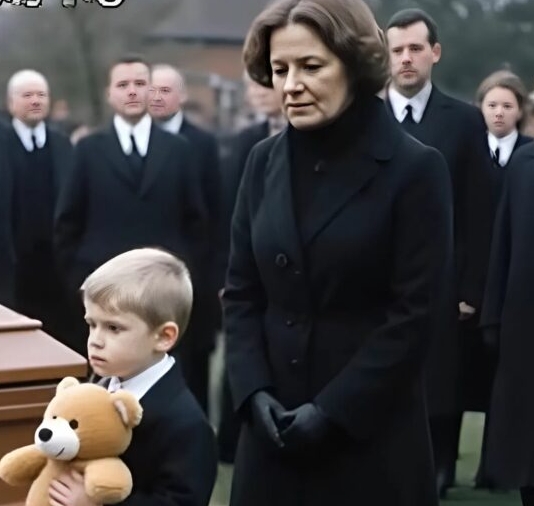When Dana was three years old, his world shattered with a quiet finality.
His mother left on a cloudy October evening. No warning. No note. She just never returned from the grocery store. Hours turned into days, and the police eventually confirmed what the family feared: she was gone.
Forever.
Too young to comprehend death, Dana simply stopped speaking.
At first, it was assumed to be shock. Then trauma. Months passed, then years, and still—not a word. Not to his father. Not to his grandmother, Lillian, who often took him in on long weekends. Not to the child psychologists with bright toys and softer voices.
He was a silent observer, withdrawn, always clutching the same teddy bear his mother had given him on his third—and last—birthday with her.
By the time Dana turned six, the silence had become part of him.
Then, just a few weeks after his sixth birthday, another tragedy struck.
His father—Lillian’s son—died suddenly of a heart attack. Only 38. No signs. No warnings.
And so, Dana, now motherless and fatherless, moved in with his grandmother full-time. She tried her best. She cooked his favorite meals. Took him to parks. Read him bedtime stories even though he never responded.
Still, he watched her with quiet eyes too old for his face.
Then came the funeral.
It was held on a bitterly cold Thursday. Grey skies. Bare trees. A gusty wind that carried leaves and murmurs between mourners. Dana stood beside Lillian, dressed in a navy coat, too big for his small frame. His teddy bear was tucked under one arm, matted and worn.
He didn’t cry. He didn’t flinch. He didn’t blink much, either.
People approached the coffin one by one, murmuring farewells and placing white roses beside the polished wood. Lillian stood silent and stoic, a hand resting gently on her grandson’s shoulder.
Then, something happened.
As the final prayer began, Dana tugged softly on his grandmother’s sleeve. She looked down, startled—he rarely even made physical contact.
And then, for the first time in almost three years, Dana turned his face toward her and spoke.
His voice was soft, but perfectly clear.
“Grandma… Daddy didn’t die in his sleep.”
Lillian froze.
Gasps rippled from the people nearby who overheard. A woman clasped her mouth. Another looked sharply at Lillian.
She stared at Dana, heart thudding in her chest.
“What… what did you say, sweetheart?” she asked gently, her voice shaking.
Dana looked toward the closed coffin. His eyes weren’t angry or frightened. They were… empty.
“He didn’t die in his sleep,” he repeated. “I saw him. Someone was there.”
The wind seemed to stop.
Lillian bent down slowly, grabbing both his small arms. “What do you mean, Dana? Who was there?”
Dana tilted his head slightly, as if trying to remember a dream.
“He said Mommy’s name. Then he fell down. He looked scared. He couldn’t breathe.”
Lillian’s mouth went dry. “When did you see this?”
“That night,” Dana said, looking up at her. “In the kitchen. I was awake.”
The priest had stopped speaking now. Eyes were on them.
“Did you tell anyone?” Lillian asked, barely able to get the words out.
Dana hugged the bear tighter. “I tried. But no one listened. So I stopped.”
He looked past her toward the trees, his voice barely above a whisper:
“I think she came back.”
Lillian stood upright, stunned, her thoughts racing.
Dana had seen something. Something that didn’t match what they were told—that her son had died peacefully, alone in bed. But the boy had witnessed it differently.
Lillian’s thoughts flashed back to the months before her son’s death.
He’d become distant. Anxious. He had begun talking again about his missing wife, claiming he’d seen her face in a crowd, once outside their home. He said things like, “She didn’t just leave.” And once, drunkenly, he muttered to Lillian, “If she ever comes back, I won’t survive it.”
The police had said it was stress. Grief. Hallucinations, perhaps.
But what if it wasn’t?
Lillian looked back down at Dana.
“Sweetheart… what exactly did you see that night?”
Dana hesitated.
Then he pointed toward the trees, where the wind had begun picking up again.
“She was there,” he said. “At the window. She looked inside. Daddy said her name. He opened the door, and she came in. But she didn’t smile. She didn’t hug him.”
He looked back at Lillian.
“She just stared. And then he fell.”
Lillian’s spine chilled.
“Was it her?” she asked. “Was it really your mommy?”
Dana slowly shook his head.
“I don’t know. She looked like her. But not all the way. Her eyes were wrong.”
His small fingers clutched the bear tighter.
“She didn’t blink.”
—
After the funeral, Lillian called the detective who had handled her daughter-in-law’s case. He hadn’t spoken to her in years. But he remembered the file.
“Her body was never found,” he said on the phone. “Just a missing person. Suspicious circumstances, sure, but never enough to pursue anything.”
Lillian told him what Dana said. The detective promised to look into it, though his voice carried hesitation.
But Lillian knew her grandson wasn’t lying.
That night, she tucked Dana into bed and kissed his forehead.
He looked up at her before closing his eyes.
“She’s not gone,” he whispered. “She’s waiting.”
Lillian sat in the dark long after he’d fallen asleep, staring at the shadowy edges of the room.
Waiting for a knock.
Or a face at the window.
